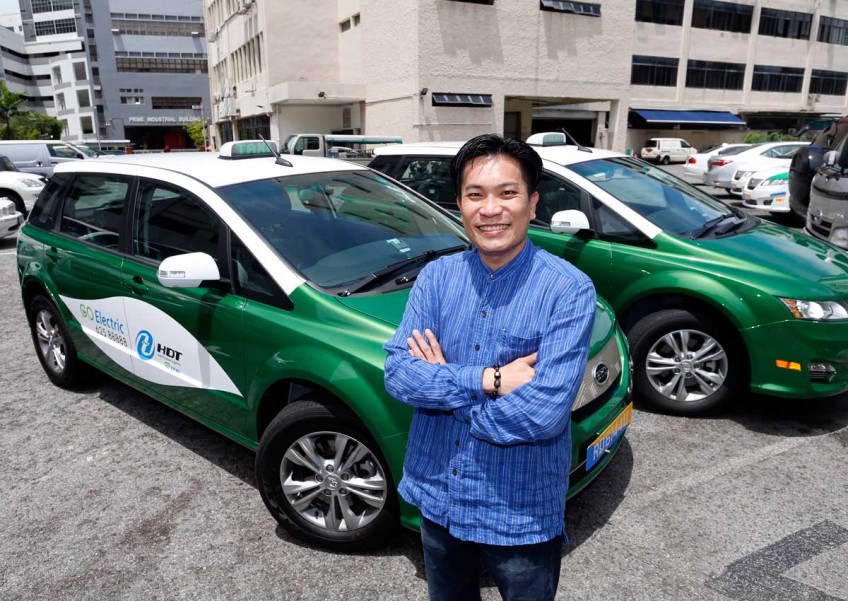HDT Singapore Taxi launches first fleet of 50 e-taxis

If crude oil gets depleted in three decades, we will need an alternative mode of transport that does not run on its derivatives.
HDT Singapore Taxi, the seventh taxi operator here, wants to fill that gap with its fleet of electric taxis - a first in Singapore.
Its managing director, Mr James Ng, said: "We hope we can be that somebody to come in to help the Government, to demonstrate that electric cars can really be the one."
HDT launched its first fleet of 50 e-taxis yesterday after rolling out a pilot fleet of 10 e-taxis late last year.
Expected to grow to 100 vehicles by June, the service is part of a Government-led Electric Vehicle (EV) project, which analyses the viability of electric transportation here.
The company is affiliated with Shenzhen-based battery and automaker BYD, and HDT's fleet of e-taxis is made by the Chinese manufacturer.
The e-taxis can be charged at any of the 57 charging stations in seven areas islandwide by early next month.
Every 1½ hours of charging allow the e-taxi to run for more than 350km, said Mr Ng.
Apart from being the first to provide an environmentally friendly public transport option, HDT is also the first to employ full-time drivers.
Called transport specialists, the drivers have statutory benefits such as an annual wage supplement and leave entitlement. Guaranteed a monthly salary base of $1,600, drivers can earn a gross salary of $3,200 if they meet the revenue target of $7,500, or $4,300 if they hit the $8,500 target.
Mr Ng also said HDT's partnership with ride-hailing app GrabTaxi will help its drivers get more jobs and make more money.
National Taxi Association's (NTA) executive adviser, Mr Ang Hin Kee, said HDT's departure from the traditional hiring model offers cabbies an alternative and hopes to see more options offered.
Mr Ang, who is also deputy chairman of the Government Parliamentary Committee for Transport, said: "Nothing is going to stop a taxi operator from offering a series of options. It will have to work out the numbers.
"And I believe for most taxi drivers, if they can toggle between the hiring model or employment model based on their needs or their own preferences, that will give them employment options that they don't currently have."
ASSESS
The MP for Ang Mo Kio GRC added that some cabbies have told NTA they are assessing whether they can sustain their income with this employment model.
Likewise, other taxi operators are monitoring if this is a business model they would want to roll out in due course, Mr Ang said.
SIM University economist Walter Theseira said that not all cabbies will be comfortable with the salaried model.
"Some are driving taxis instead of driving vans or buses precisely because they want the freedom to set their own hours and make their own decisions on when and where to drive," he said.
Transport economist Michael Li thinks HDT's business model will be sustainable as long as they can find the balance of risk sharing - the company gives its drivers employment benefits, and the drivers will take in some risk in the form of lower income if they do not perform well enough to hit the company's revenue target.
This is in contrast with the current business model in the industry, where cabbies do not get any benefits.
The associate professor from Nanyang Technological University added that with the disruption in the industry, taxi drivers are earning less.
"Taxi driving is not that attractive a job any more. The sustainability of the other taxi operators is the one that's under question," he said.
Full-time pay means less worry for him

Whenever his wife asked him to take the family out to East Coast Park on Sunday mornings, he used to hesitate.
For cabbies like Mr Michael Ng, 52, time is money.
To make sure he earns enough to cover the daily taxi rental, he would complete a few trips early in the morning, and continue driving after spending some time on the beach.
Now, the father of three no longer has to worry.
As an electric taxi driver with HDT Singapore Taxi, he gets a monthly basic pay of $1,600 and more if he hits the company's revenue target.
"If I want to take a day off, I can do it as long as I can achieve the company target," he told The New Paper yesterday.
Having driven for several taxi operators over the past decade, Mr Ng was growing tired of being a cabby.
"Every morning I am on the road, I have to hunt for passengers. Even if I wanted to rest, the first thing on my mind would be the rental. I had to drive around enough to cover the rent before I could rest," he said.
At his wife's encouragement, he tried out the full-time employment structure at HDT - a first in the taxi industry here.
"...I'm glad I made the right decision," he said, beaming.
"Besides getting what I'm earning as a normal taxi driver, I get benefits including Central Provident Fund (contributions), medical coverage and insurance.
"When it comes to welfare, it's the priority on my boss' mind. I always tell the newer drivers that it's like a family here," he added.
As Mr Ng is earning more than he used to, he can afford to spend a little more on things like a more extravagant Valentine's Day present for his wife.
"I bought her something from Pandora this year."
fjieying@sph.com.sg
Read also: Fixed salary carrot a hit with HDT taxi drivers

This article was first published on Feb 25, 2017.
Get The New Paper for more stories.